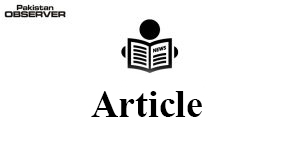Digitalisation of AIOU
ALLAMA Iqbal Open University (AIOU),the second oldest open university of the world and the first open university of Asia, has been imparting quality education to hundreds of thousands of students mainly through open and distance mode.
However, the recent technological innovations in the field of education and especially distance education has posed a serious challenge to AIOU to keep pace with other sister universities, based in developed as well as developing countries.
Adoption of the latest information and communication technology in the field of education is no longer a matter of choice in the present age, rather it has become an absolute minimum requirement and an effective tool for better instructional management, good governance and survival in today’s highly competitive market of knowledge economy.
Presently, AIOU is catering to the educational needs of around 1.3 million students of varying levels with its 55 regional campuses across the country while its main campus is based in Islamabad.
The university has recently expedited the process of further extending its educational network to other far flung areas of the country, which lack basic formal educational facilities.
Moreover, the university has lately signed various Memorandums of Understanding (MoUs) and Letters of Intent (LoI) with various national and international educational, technological and skill-based organizations to realize the goal of providing quality educational facilities across Pakistan by blurring spatial boundaries.
This exponential extension of the university and running academic and administrative operations of this mega university amicably without full adoption of the latest digital technologies is in fact a very difficult task.
Keeping in view the vision and mission of AIOU of imparting quality education to its millions of students at their doors step, the situation was demanding special steps to be taken.
Such a situation needed the services of an instrumental leader who vigilantly monitors the environment, helps his organization adapt to the changing circumstances, acquires essential resources for survival, formulates strategies and works on their implementation.
After a careful analysis of the prevailing situation and sensing tomorrow’s needs Prof Dr Zia Ul-Qayyum, the present VC of the university, took a proactive action in 2019, just a few months after he took the charge of AIOU as VC, and initiated a project of digital transformation of the university for which he allocated a handsome amount of money from university’s own resources after due approval from statutory bodies of the university.
The project was envisioned to function as a platform for planning, development, deployment and management of smart services aimed at students’ facilitation, staff/faculty efficiency enhancement and to provide technological base to executives for decision making, strategic planning and good governance.
The project was aimed at revamping the various processes ranging from admissions, fee deposit, sharing/ dispatching books, tutors’ registration and allocation of courses, examinations, availability of resources through integration of learning management system (LMS) and campus management system (CMS) including student /tutor digital space, access to sports and co-curricular activities, access to library resources, alumni services, regional connectivity and provisioning of support services by digitalizing them.
After diagnostic analysis of problem, the Directorate of ICT as a prognostic step toward its solution worked on upgradation of network infrastructure, firewall, call centre desktops, optical fibre network at the main campus, bandwidth, and servers; networking of infrastructure of the regional offices/ centres, installation of security/ surveillance and biometric attendance systems, internet connectivity of regional campuses; deployment of antivirus solution; establishment of data centre, complaint management system, labs at regional centres, smart class rooms, laptops for faculty and officers; launching of short code based info/support services.
Moreover, it worked on acquiring higher layer services like Enterprise Resource Planner (ERP), and Campus Management System (CMS) with embedded Business Intelligence layer.
More importantly, as we know that the Covid-19 pandemic has affected education system throughout the world very badly and Pakistan is no exception.
However, the far sightedness of the incumbent vice chancellor of AIOU has lessened the negative effect on the admission as well as evaluation system of this mega university of Pakistan.
The deployment of a customized learning management system (LMS) at the AIOU known as Aaghi LMS Portal supported by virtual classrooms enabled the university to conduct courses workshops (since Spring 2020 semester) of post graduate programmes and End Term Assessment (final examinations) successfully.
Upgradation of servers of the university helped it to conduct online classes of 1,45,000 students simultaneously.
In order to help students to avail the services embedded in new system of AIOU, the university in the last few months inked MoUs with all telecom operators of the country to provide subsidized internet packages to the AIOU students and tutors.
The present age is rightly called digital age as the new media has revolutionized almost every walk of human life.
Today, the overall technological infrastructure of a country and/ or an organization is viewed as one of the standards of development of that country/ institution.
Allama Iqbal Open University through digitalization/ automation of its academic, financial, and administrative operations will become a true leader amongst the educational institutions of the country.
We hope that digital transformation of this national institution which has waged a holy war against illiteracy in the country, and which is providing low cost but quality education to the poor, disadvantaged and marginalized strata of the society will auger well for achieving its objectives of spreading education to all and sundry across the country.
—The writer is Associate Professor at Department of Mass Communication, AIOU.










